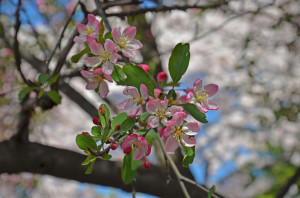 While running on a dirt road, up a slight hill, the Kelly green of the forest floor nearby, a soft breeze washed over me and there was the sweetest scent, I imagined, from the fruit trees nearby. Ah, finally, the sweet smell of spring, an antidote for the sickness of mind that is modern society.
While running on a dirt road, up a slight hill, the Kelly green of the forest floor nearby, a soft breeze washed over me and there was the sweetest scent, I imagined, from the fruit trees nearby. Ah, finally, the sweet smell of spring, an antidote for the sickness of mind that is modern society.
We’ve heard the metaphor in politics, invoking “spring,” the network herd of media mimics murmuring thoughtlessly the word “spring,” repeating it again and again as if it were true, misapplying this glorious time of year to mid-East street protests, armed conflict, American air strikes, AK-47s fired in the air, blood leaking through the dirt, improvised bombs, cries of pain, and needless death.
Such dystrophic destructive events cannot be compared — however you may stretch and pull a poetic metaphor — with spring’s awakening of that renewable life dormant through the cold and hard seasons until the moment when the sweet scent drifts in the air anew.
Of course, much of our public dialogue is imprecise, unfocused and misleading if not a lying whopper to lull the mind to sleep or to misdirect our attention from what really matters to what we can fear or hate. It is this sickness of mind we must cure.
When I was young, I played a Seabee in South Pacific, and heard over and over in rehearsal the lyric how you have to be taught, carefully taught, how to hate and fear.
Much of our public dialogue is about hate and fear.
Spring is not about hate and fear but we have so much hate and distaste in our society for people we don’t know and things we don’t experience and perhaps never will and that truly affect us not at all.
Renewal is a life-giving, vitalizing act.
When I write or speak about matters, I confess it’s because I have the very clear impression that we have to shake up the thoughtless rule of thumb world and because my sense of things as they are implies a better order.
It’s because I remember springs when the scent of success meant accomplishing something vitalizing, not putting down or diminishing someone or something else. It’s not an impulse to “show them.” It’s an act for its own goodness.
I like to write and re-tell what I call “happy stories,” snapshots of what some might call “ordinary” people doing things that even their friends and next door neighbors don’t know about.
These are individuals who are uncelebrated, affirming life, teaching children, each other, biking, baking, helping a motorist, making soap, healing, creating art, gardening, sculpting, building a walkway, acting, protecting historical treasures, hitting the heavy bag, milking a goat, keeping the peace, dancing, raising livestock, farming, singing, hunting, strumming a guitar, riding a horse, knitting, running, skating, writing poems and short stories (not even for publication), repairing themselves, climbing, making their own greeting cards, open-miking, lifting weights, doing things that they care about, that they want and need to get done.
But they don’t fit into the basic ten popular story categories we read or hear about almost exclusively on a daily basis – you know – murder, theft, sexual abuse, drugs, public misconduct, war, disaster, star trivia, incompetence, inaction. If we are what we eat, myself included, we are almost certainly what we read or hear and see and think about and, of course, we are finally what we do that is creative or wasteful with this short moment that we call a life.
A true spring is reviving a dormant life, giving a helping hand, uttering a kind word, doing something that’s difficult that makes a difference but also doing something for yourself.
This is the moment to resolve to make something better and to envelope others in the sense that this truly is the sweet scent of this glorious season.
